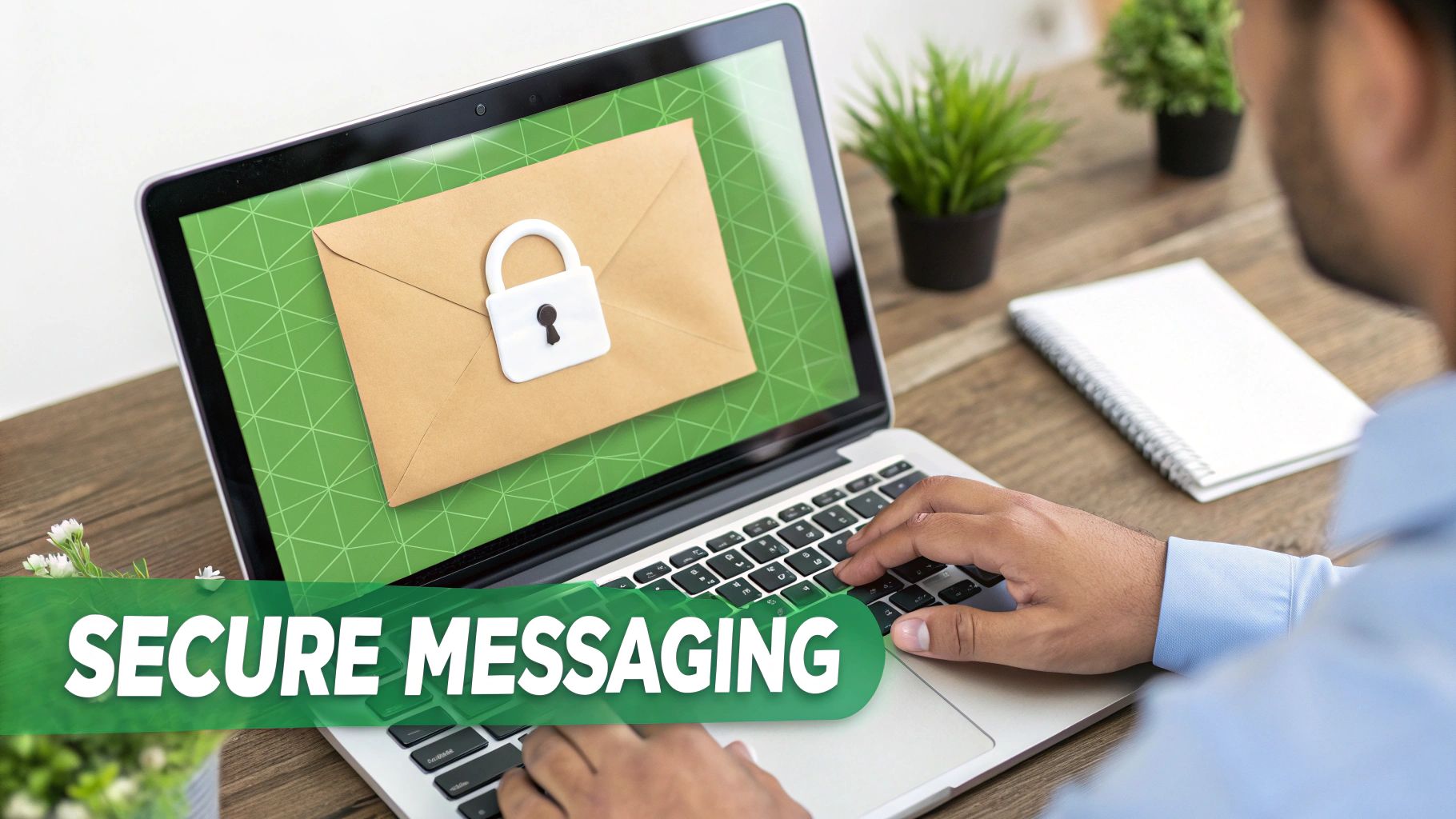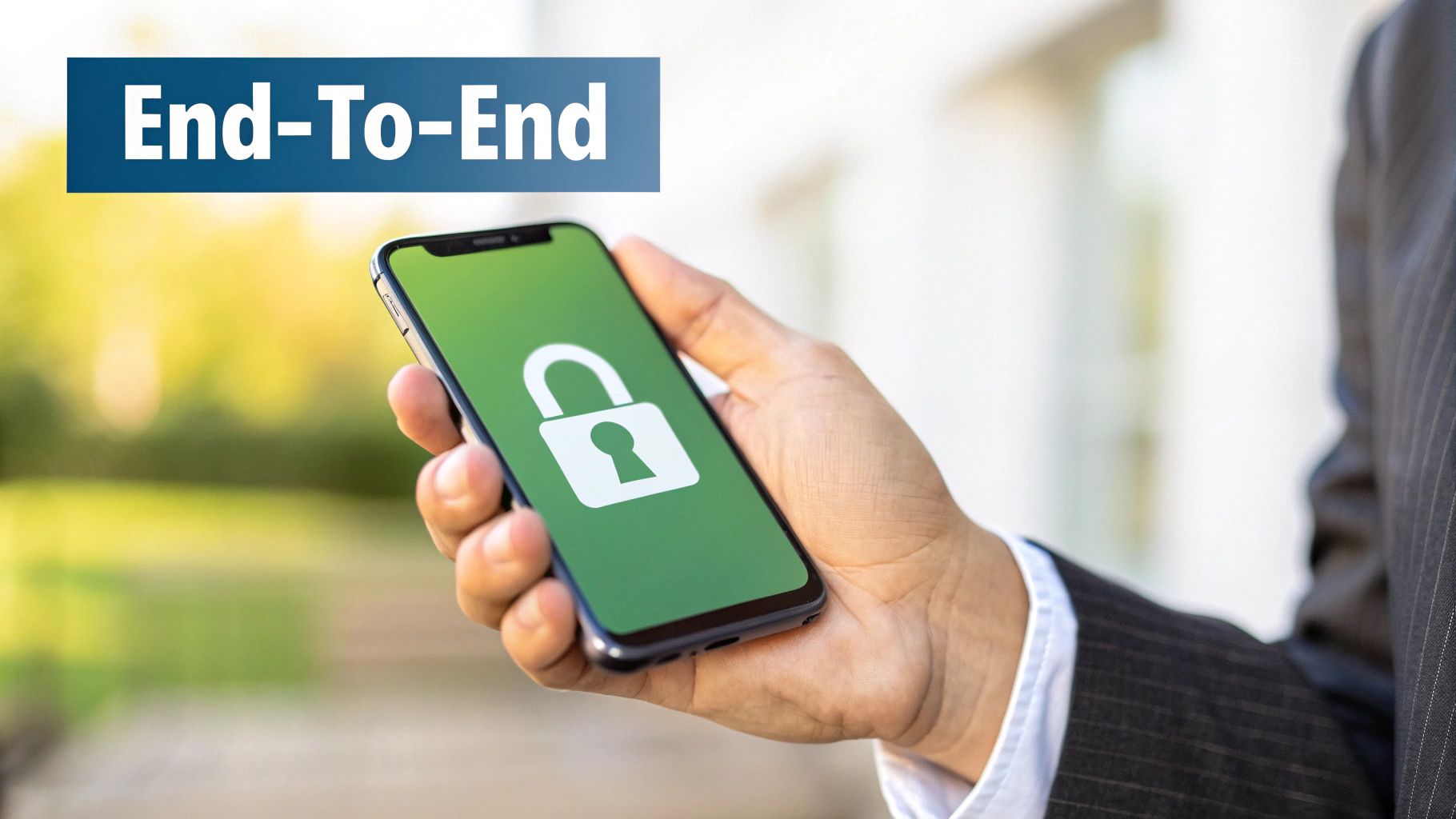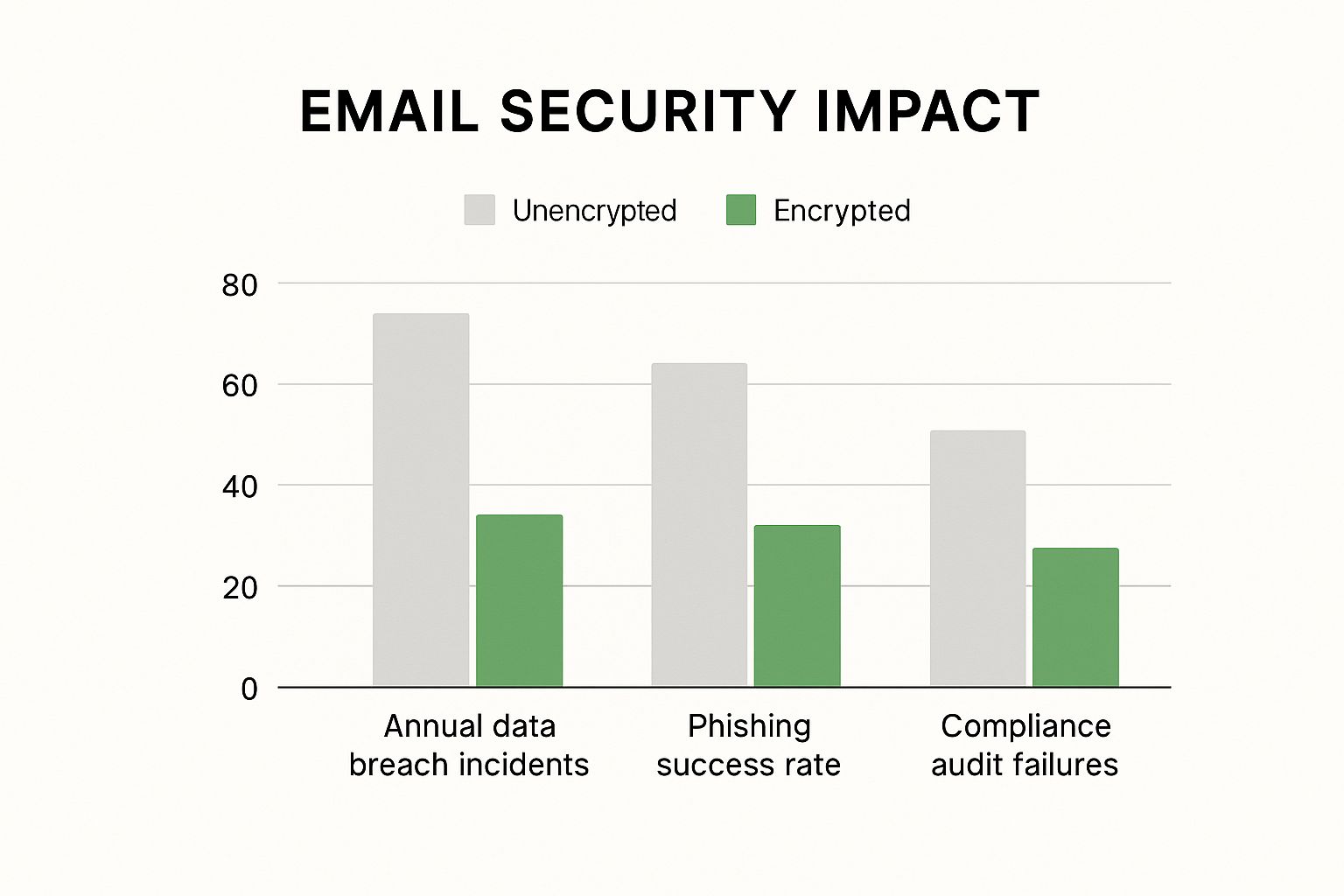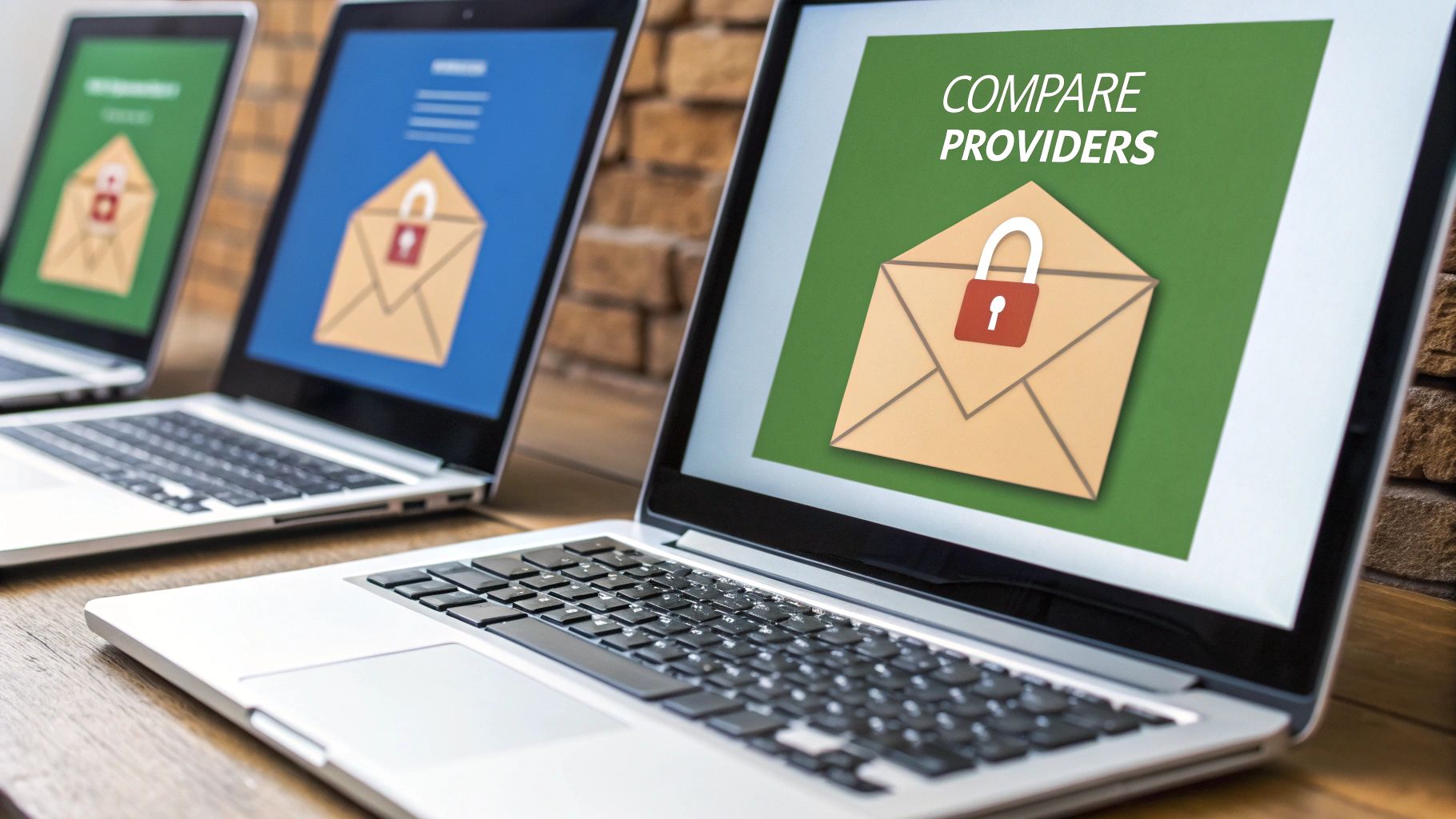Finding the Best Encrypted Email Solutions

It’s easy to think of your email inbox as a private, personal space, but that’s a dangerous misconception. In reality, a standard email zips across the internet much like a postcard—it’s completely open for anyone to read along the way. Switching to an encrypted email solution is the only way to turn that postcard into a sealed, confidential letter, making sure your messages are for your recipient's eyes only.
Why Secure Email Is a Modern Necessity

The risks of unencrypted communication go far beyond casual snooping. Sophisticated threats like business email compromise (BEC) and targeted phishing attacks are built to exploit the weak spots in traditional email, costing organizations billions every year. Even with the security measures your standard provider has in place, they often aren't enough to stop a determined attacker or state-level surveillance.
This growing awareness of risk is causing a massive shift. The global market for email encryption, valued at USD 9.30 billion in 2025, is expected to skyrocket to USD 23.33 billion by 2030. This boom isn’t just a trend; it reflects a new reality where protecting your data is simply not optional anymore.
Protecting More Than Just the Message
Real digital privacy means securing every piece of your communication. Encrypting the body of an email is the obvious first step, but many people forget about the metadata. Details like who you're emailing, the subject line, and when you sent it can be just as revealing as the message itself.
An encrypted message body protects your secrets, but unsecured metadata tells the story of who you share them with. A complete security strategy has to account for both.
This is precisely why picking the right encrypted email service is so important. The best providers don't just lock down the content; they also minimize the metadata they collect and store, giving you a much more robust privacy shield.
Meeting Compliance and Building Trust
For professionals and businesses, using encryption is often a legal and ethical mandate. Regulations like GDPR in Europe and HIPAA in the United States have strict rules about how personal and health information must be handled. A failure to secure client communications can lead to crippling financial penalties and destroy the reputation you’ve worked hard to build.
By making the switch to an encrypted email solution, you’re taking a proactive step toward several key goals:
- Regulatory Compliance: You'll meet the legal standards for data protection and steer clear of massive fines.
- Client Trust: You demonstrate a serious commitment to protecting your clients' sensitive information.
- Personal Privacy: You shield your own personal conversations from unwanted eyes.
It’s more than just a technical upgrade. It's about building a foundation of trust with clients and partners. To get a better sense of the immediate advantages, it's worth exploring the top benefits of encrypted email you need to know.
Understanding How Email Encryption Works

Before you can pick the right encrypted email service, it helps to understand what’s actually happening under the hood. It’s a bit like choosing a lock for your front door—you need to know if you're getting a standard deadbolt or a high-security vault door. The two main concepts you’ll run into are Transport Layer Security (TLS) and End-to-End Encryption (E2EE).
Most email providers today use TLS. Think of it as a secure tunnel. It encrypts your message as it travels from your device to your provider's server, and then again from their server to the recipient's. The weak point? The email sits unencrypted on the servers themselves. This means your email provider can see its contents.
The Power of End-to-End Encryption
This is where end-to-end encryption changes the game entirely. With E2EE, a message is scrambled on your device and can only be unscrambled by the person you sent it to. Your email provider has no way to read it, even if they were forced to try.
This superior level of privacy is why so many people are turning to these services. The global E2EE market was valued at roughly USD 3.8 billion in 2024, and North America makes up a 37.6% share of that. It’s a clear signal that people are taking their data privacy seriously. You can dive deeper into these market trends over at Market.us.
So, how does it work? E2EE is built on a clever system called asymmetric cryptography, which gives every user two separate but connected keys:
- Public Key: You can share this with anyone. People use it to encrypt messages to you.
- Private Key: This stays secret, stored only on your device. It’s the only thing that can decrypt messages sent to you.
A great way to think about it is that your public key is like an open-slot mailbox that anyone can drop a locked message into. Only you have the private key to unlock and read what's inside.
Zero-Knowledge and Protecting Metadata
This public/private key system is the foundation for what’s known as a zero-knowledge architecture. The best providers design their platforms so they never have access to your private key. Because of this, they have "zero knowledge" of your password or your data, making it impossible for them to decrypt your emails.
But there’s one more detail to consider. Even with E2EE, your email’s metadata—who sent it, who it’s for, the subject line, and the timestamp—can still be exposed. This data alone can paint a surprisingly detailed picture of your life. The top-tier secure email providers go the extra mile to encrypt or obscure this metadata, offering a more complete privacy package. It’s these finer points that separate a good service from a truly secure one.
Comparing the Top Encrypted Email Providers
Choosing the right encrypted email provider can feel like splitting hairs. On the surface, the top contenders all promise security and privacy, but the best fit for you depends entirely on what you’re trying to protect. Are you a journalist safeguarding sources, a business locking down client data, or just an individual taking back control of your digital life?
We're going to compare the heavyweights like Proton Mail and Tutanota with an agile alternative like Typewire. This isn't just a feature list; it's a look at the practical differences in their security models, day-to-day usability, and the unique tools they bring to the table. These are the details that actually matter.
This chart drives home just how significant the shift to encrypted email can be. It's not a small improvement; it’s a fundamental change in your defense against data breaches, phishing, and compliance failures.

The numbers speak for themselves. Adopting a secure email solution dramatically reduces risk across the board, making it one of the most effective security moves you can make.
The Established Leaders: Proton Mail and Tutanota
If you’ve heard of secure email, you’ve probably heard of Proton Mail. Based in Switzerland, it's the biggest name in the game for a reason. Proton builds its security on OpenPGP, a trusted and battle-tested standard for end-to-end encryption. Their zero-knowledge architecture means that even they can’t decrypt and read your emails.
What really helps Proton Mail is its familiar, modern interface. It feels a lot like Gmail, which makes switching from a mainstream service surprisingly painless.
Tutanota, operating out of Germany, offers a similar promise of absolute privacy but takes a different path to get there. It encrypts more than just the email body—your subject lines, contacts, and calendar events are also locked down. This provides a more holistic privacy shield, but it comes at a cost. Tutanota uses its own proprietary encryption standard, which isn't compatible with PGP.
Key Differentiator: Proton Mail's use of OpenPGP means it works seamlessly with other PGP users, while Tutanota’s proprietary system offers more comprehensive encryption but only within its own ecosystem.
This single distinction is a major fork in the road. If you regularly need to exchange encrypted emails with people outside your provider's network (who likely use PGP), Proton Mail is the practical choice. If your secure communications are mostly internal or with other Tutanota users, its all-encompassing encryption is a huge plus.
A Different Approach: Typewire
Proton Mail and Tutanota are fantastic for individual privacy, but what about businesses and teams? Their needs are different, and that's where a service like Typewire steps in. Think of it less as just an encrypted inbox and more as a secure private email hosting platform. It's designed to give organizations full control over their email infrastructure.
Typewire carves out a niche for businesses that need more than a single secure account. It’s all about providing a secure, ad-free environment with dead-simple custom domain support and team management features. For a wider look at your options, our guide on the 7 best email for privacy options in 2025 offers even more context.
So, how do these three stack up head-to-head? This table breaks down the key differences to help you see where each one shines.
Encrypted Email Provider Feature Breakdown
This detailed comparison breaks down the security architecture, usability, and unique features across Proton Mail, Tutanota, and Typewire to help guide your decision.
| Feature | Proton Mail | Tutanota | Typewire |
|---|---|---|---|
| Encryption Standard | OpenPGP (Industry Standard) | Proprietary (AES & RSA) | Server-side encryption with TLS |
| What's Encrypted | Message body & attachments | Body, attachments, subject lines, contacts | Data in transit and at rest |
| Jurisdiction | Switzerland | Germany | United States |
| External Communication | PGP compatible | Via password-protected link | Standard SMTP/IMAP |
| Best For | Individuals needing interoperability & a full privacy suite (VPN, Calendar). | Users wanting maximum encryption within a closed ecosystem. | Businesses needing private hosting, custom domains, and team management. |
| Unique Selling Point | Broadest ecosystem of privacy tools. | Encrypts metadata like subject lines. | A secure, ad-free private hosting platform built for business control. |
Ultimately, there's no single "best" provider—only the best one for your specific situation.
- If you're an individual who values a large ecosystem and the ability to communicate with other PGP users, Proton Mail is a powerhouse.
- If you want the most comprehensive encryption possible and mainly communicate within a closed loop, Tutanota has the edge.
- But if you're a business or team that needs control, custom domains, and dedicated private hosting, Typewire offers a practical and powerful solution built for your needs.
Looking Under the Hood: Security Models and Privacy Protections
When you're shopping for a secure email service, it's easy to get lost in feature lists. But the real strength of any provider comes down to two things: their technical security design and the laws of the country they call home. These are the foundations that determine whether your privacy is truly protected.
Think of it this way: a service based in Switzerland benefits from some of the world's strongest privacy laws. A provider in Germany also has robust protections, but the legal landscape is different. You have to understand these jurisdictional nuances to pick a service that actually matches your security needs.
This isn't just a niche concern anymore. The global email encryption market was valued at USD 7.75 billion in 2024 and is projected to hit USD 40.16 billion by 2033. That explosion is happening because people and businesses are waking up to the risks of data breaches and the demands of new regulations. You can see more data on this trend in the email encryption market report from Straits Research.
The Gold Standard: Zero-Knowledge Architecture
Beyond where a company is located, how they build their system is what really matters. For genuine privacy, the benchmark is a zero-knowledge architecture. It’s a simple but powerful concept: the provider has zero access to your encryption keys. This means they physically cannot decrypt your emails, ever.
For anyone serious about security, this should be a deal-breaker. If a provider manages your keys, they can be compelled—or hacked—to hand them over. That's a single point of failure you don't want.
The ultimate proof of a zero-knowledge system? The provider can't recover your password. If you lose it, your data is gone. While that might sound scary, it’s the best guarantee you have that no one but you can ever access your inbox.
It's a classic security trade-off. You get absolute privacy, but you also take on the full responsibility for managing your password and recovery keys.
Don't Forget About Metadata
Encrypting the body of your email is a great start, but it's only half the battle. A shocking amount of sensitive information lives in the metadata—the data about your data.
Even if the message content is unreadable, metadata can reveal a lot:
- Who you're talking to: The sender and recipient addresses.
- What you're talking about: The subject line.
- When you're talking: Timestamps that show patterns and frequency.
If left unprotected, this information can be just as revealing as the message itself. The best providers know this and go the extra mile to encrypt or strip as much metadata as possible. For example, some services are built from the ground up to encrypt subject lines, which offers a much stronger privacy shield.
The technologies behind this are fascinating and complex. To get a better handle on them, our essential guide to secure email protocols is a great place to start. In the end, you have to look at both the technical model and the approach to metadata to make a truly informed decision.
Choosing the Right Encrypted Email for You

The "best" encrypted email service isn't about which one has the longest feature list. It's about finding the one that actually fits how you work and communicate. You have to look past the technical jargon and really think about your day-to-day needs, who you're talking to, and what kind of information you're trying to protect.
What works for a journalist shielding anonymous sources is going to be wildly different from what a small business needs to manage client conversations. The real trick is translating those technical specs into practical benefits. Let's walk through a few common scenarios to see how different priorities lead to very different choices.
Matching the Tool to the Job
Here’s a breakdown of how different people might choose an encrypted email provider, based on their unique situations and what they value most.
Scenario 1: The Healthcare Professional
Imagine a therapist who needs to communicate with patients. Their absolute number one concern is HIPAA compliance. They're dealing with incredibly sensitive information and need to send secure messages to clients who are probably using regular Gmail or Outlook accounts. This means ease of use for their non-technical patients is just as critical as the security itself.
- Top Priority: Guaranteed HIPAA compliance and a simple way to communicate securely with people outside their system.
- Must-Have Features: A system that lets them send a password-protected link to external recipients, keeping the message encrypted no matter what email service the client uses. A signed Business Associate Agreement (BAA) is also a must-have, no exceptions.
- Solid Choice: A service like Proton Mail for Business is built for this. It has specific features for HIPAA and a smooth guest portal for people who don't have a Proton account.
Scenario 2: The Small Business Team
Think about a small marketing agency. They need secure email, but they also need to look professional. That means using their own custom domain (yourname@yourbusiness.com). They also need a simple way to manage accounts for their team without needing a dedicated IT person.
For any business, an encrypted email service has to do more than just protect data—it needs to work seamlessly with their operations. Easy custom domain setup and straightforward user management are just as important as the encryption itself.
- Top Priority: Professional branding with custom domains, simple team management, and an ad-free experience.
- Must-Have Features: A private hosting model for full control, an intuitive admin dashboard, and powerful spam filtering that just works.
- Solid Choice: This is precisely where a platform like Typewire shines. It was designed for this exact use case, blending secure private hosting with incredibly simple custom domain and team setup. You get a professional, private email solution without the typical self-hosting headaches.
Scenario 3: The Privacy-Focused Individual
Now, consider someone who simply wants to take back their digital privacy from Big Tech surveillance and data mining. Their main goal is maximum anonymity and the strongest encryption they can get for their personal emails. They’re often willing to put up with a bit of a learning curve if it means getting best-in-class security.
- Top Priority: Anonymity, a zero-knowledge architecture, and encrypting as much of the email as possible.
- Must-Have Features: The ability to sign up anonymously (without providing personal info), encryption for metadata like subject lines, and being based in a country with strong privacy laws.
- Solid Choice: Tutanota is a fantastic fit here. Its unique encryption protocol protects more metadata than standard PGP-based services, and it operates under Germany's strict privacy-friendly regulations.
Answering Your Questions About Encrypted Email
Even after you're sold on the idea of secure email, a few practical questions always seem to pop up. It's one thing to understand the theory, but it's another to picture how it works day-to-day. Let's tackle some of the most common concerns head-on to clear up any lingering doubts.
Making the switch to an encrypted email solution is a big step, so it’s important to know what you’re getting into—and what the limitations are. From sending a message to a friend on Gmail to understanding what "anonymous" really means, these answers will help you make a fully informed choice.
Can I Email Someone Who Doesn't Use an Encrypted Service?
Absolutely. This is probably the most critical question for anyone who needs to communicate with the outside world, and the answer is yes. The best providers have figured out a clever way to handle this.
When you send a secure message to someone on a standard service like Gmail or Outlook, your provider doesn't just send the email. Instead, it sends a notification with a secure link. Your recipient clicks that link, enters a password (which you've shared with them separately, like over a signal message), and views your message in a private, encrypted web portal. It keeps your message content safe from end to end, even if their inbox isn't secure.
It adds an extra step for them, so it isn't quite as smooth as emailing another user on the same platform, but it makes secure email practical for everyday life.
Does Encrypted Email Make Me Completely Anonymous?
No, and this is a really important distinction to grasp. Encrypted email provides confidentiality, not anonymity. It’s designed to protect the content of your messages from prying eyes, but it doesn't automatically hide who you are.
Think of it like a sealed, tamper-proof envelope. Anyone can see the envelope was sent from your address to someone else's, but no one can read the letter inside. While services like Proton Mail let you sign up without providing personal info, true anonymity requires more. You’d need to pair your encrypted email with tools like a VPN or the Tor network to hide your IP address and location.
Encrypted email is a powerful tool for privacy, but it's just one piece of a much larger strategy if total anonymity is your goal.
What Is the Difference Between PGP and Modern Encrypted Email?
PGP (or Pretty Good Privacy) is the granddaddy of email encryption. It's the open-source technology that set the standard for security, but it has a well-earned reputation for being clunky and difficult for non-technical folks. Using it correctly involves manually creating, sharing, and managing public and private encryption keys.
Modern encrypted email solutions, like Proton Mail or Tutanota, essentially take the rock-solid security of PGP and wrap it in a simple, user-friendly interface. They automate all the complicated key management behind the scenes.
This is the key innovation. You get the same powerful encryption without ever having to see a key or run a command line. It’s what makes high-level security accessible to everyone, not just coders and security experts.
What Happens If I Forget My Password?
This is where the reality of zero-knowledge security hits home. When a provider says they have zero-knowledge, it means they have no way to see your password or access your private decryption key. That’s the entire point—it's what guarantees no one, not even the company itself, can read your emails.
The direct trade-off is that if you forget your password and lose your recovery phrase or key, your encrypted data is gone for good. There's no "Forgot Password" link that can magically restore your access. Your provider simply can't help you. In exchange for absolute privacy, you take on absolute responsibility for your credentials.
Ready to take control of your email privacy with a platform built for security and ease of use? Typewire offers private, ad-free email hosting with simple custom domain setup and powerful team management. Start your free 7-day trial today and experience a truly secure inbox.
Finding the Best Encrypted Email Solutions
Posted: 2025-07-17
Professional Email Greeting: Master the professional email greeting today
Posted: 2026-02-10
What is Email Phishing: Securing Your Inbox Against Digital Fraud
Posted: 2026-02-06
10 Email Retention Policy Best Practices for Security and Privacy in 2026
Posted: 2026-02-03
Top 12 Secure Alternatives to Gmail for Privacy in 2026
Posted: 2026-01-31
What Is Email Alias: A Guide to Better Email Security and Privacy
Posted: 2026-01-27
How to Send an Encrypted Email and Protect Your Digital Privacy
Posted: 2026-01-23
Email Hosting Canada The Definitive Guide to Privacy and Security
Posted: 2026-01-20
How to Send Email Securely: A Guide to Real Privacy & Security
Posted: 2026-01-16